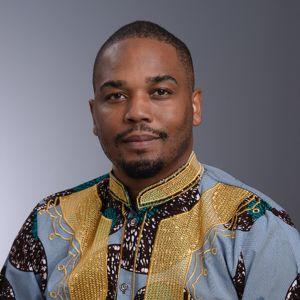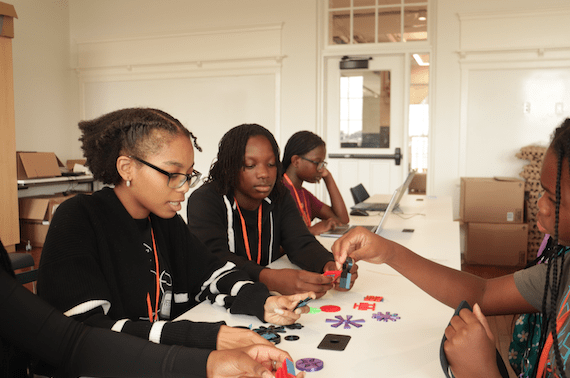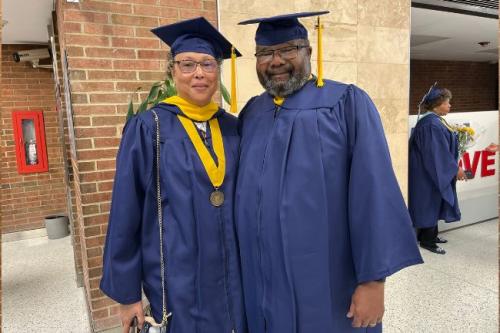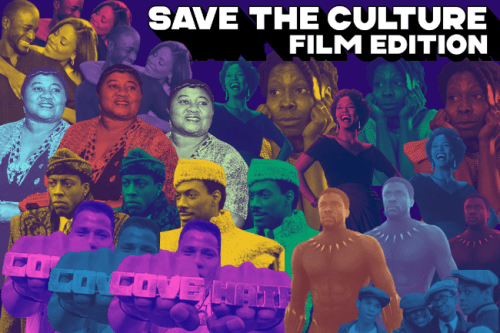Each summer, the Howard University campus comes alive with a different kind of energy —not just from college students, but from middle schoolers discovering the power of STEM and the richness of their cultural identity.
At the heart of this transformation is the Verizon Innovative Learning STEM Camp, a program that does more than teach — it nurtures. Led by Dr. Kofi LeNiles, the camp blends science, technology, engineering, and math with deep mindfulness, cultural connections, and community love. Now in its seventh year, the camp continues to empower young minds through African-centered learning and a holistic approach to education.

Dr. LeNiles, known as “Baba Kofi,” to students, serves as the principal investigator and director of the Verizon Innovative Learning Grant at Howard University. He also teaches Educational Leadership and Policy Studies at Howard and is a full-time assistant professor at Towson University.
Q: How did the Verizon STEM Camp get started?
A: “I was a doctoral student when I helped write the initial grant proposal back in 2017,” says LeNiles. “The first camp launched in 2018. I've been part of it ever since.” Working alongside Dr. Kmt Shockley, he helped secure the funding and build the foundation for the program.
Q: What’s the key to the camp’s long-term success?
A: “People,” says LeNiles. He credits the leadership of School of Education Dean Dawn Williams , who has supported the program from day one. “We’ve got a strong team — dedicated administrators, committed teachers who come back every year, and families who spread the word. It all starts with the human resource.”
Q: What was new in the 2025 summer program?
A: This year emphasized mindfulness and holistic development. “Mama Nakima led yoga and meditation sessions. We created space for students to reflect on who they are, what they want out of their day, their class, and their life,” says LeNiles. “We’re not just building skills — we’re nurturing self-awareness.”

Q: How does the camp foster a sense of community?
A: “It’s the relationships,” he explains. “The adults know each other, joke with each other, and talk about their families. That feeling of community — of genuine care — makes it easier to teach STEM and culture together. Love and laughter are part of the curriculum.”
Q: You speak passionately about African-centered education. What drew you to it?
A: “I got into culturally affirming education because I saw it worked,” he says. His experiences in K-12 education showed him the transformative power of centering Black children in their own history and culture. “When students learn about who they truly are — across thousands of years — it gives them power. African-centered education is about helping young people solve their community’s challenges using their own cultural foundations.”
Q: How does this connect to your teaching and research?
A: LeNiles sees culturally affirming education as a path to freedom — intellectual, emotional, and spiritual. “It’s a liberatory process,” he says. “We’re not just teaching content. We’re engaging in something much deeper: healing, remembering, and reimagining who we are.”
As another successful summer of the Verizon STEM Camp wraps up, the impact is clear — not only in the projects completed or lessons learned but in the confidence, curiosity, and cultural pride the students carry forward. LeNiles and his team have done more than create a curriculum; they’ve cultivated a village. And in that village, future innovators, educators, and leaders are finding their place — rooted in history, inspired by possibility, and surrounded by love.
The Verizon STEM Camp at Howard University continues to be a beacon of innovation, not just in science and technology — but in heart, heritage, and humanity.




